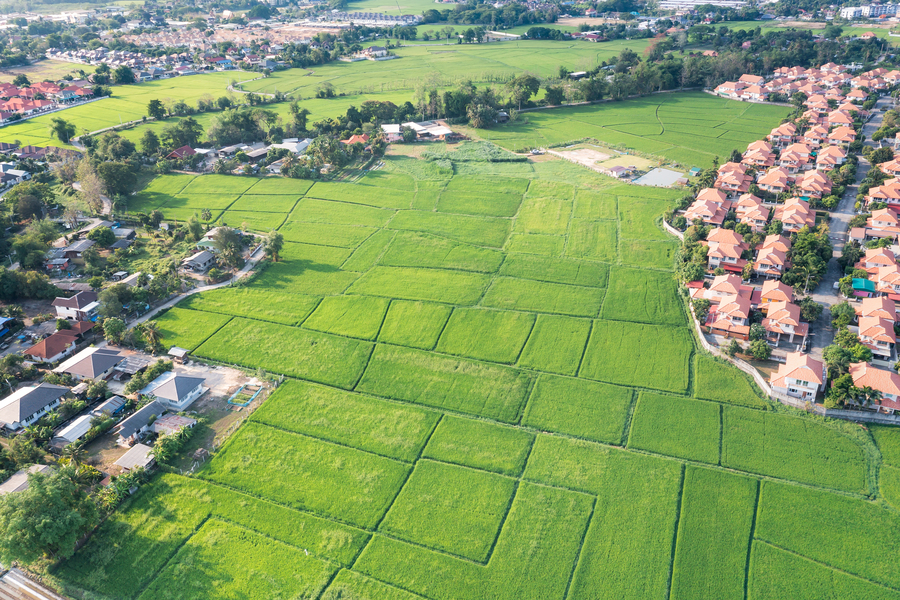Agricultural land, like residential land, can be bought or leased. Agricultural real estate differs in that these properties are mainly used for commerce, specifically crop or livestock production.
In residential resale real estate, the land is secondary to the footprint of the house on the lot and the dwelling’s functionality.
Investors and farmers should pay close attention to how much land they need to own, lease, or, in the case of selling the property, how much land they need to purchase based on their investment needs and already available resources.
Forward-thinking Farmers
While having too much land might be problematic and result in future cash flow issues, not having enough land can result in resource limitations and negatively impact business expansion.
Thinking beyond the needs of today, particularly with anticipated population and immigration growth, is a savvy strategy for those looking to acquire real estate in the agricultural sector. With the recent supply chain issues coming out of COVID-19, the emphasis on local agriculture to feed the local population has never been greater.
Partnering with a strong real estate salesperson is key when purchasing a for-profit, agricultural property. Having a real estate salesperson with knowledge in agricultural matters such as measures of soil quality and its maintenance, MPAC farmland classifications, land utilization, and crop rotation, yield rates, crop demand and proximity to customers, water source and restrictions, land topography, necessary outbuildings, growing season and climate impactors, and lastly, flood zoning on and around the agricultural property is paramount.
Canadian Real Estate Wealth tapped Adam DeGroote of Re/Max Twin City Realty Inc. for his expertise. Adam is not only a top producer for Norfolk, Brant, and Oxford County but has a lot of knowledge when it comes to rural real estate sales. We asked Mr. DeGroote for his insights on the importance of local knowledge when dealing with farmland sales
“Ideally, you want a Realtor who was born and raised into a farming lifestyle and community, so when it comes to understanding how to add or find value to a farm property, their insight comes from their very own firsthand experience and their father and grandfathers before. Squeezing efficiencies and adding value to the farm are also conversations to be had and you want someone with an excellent understanding of what to do and whom to speak to in order to help further your agricultural business and investment. I know of a very small handful of REALTORS ® that can bring that level of experience and commitment to the table, and with that, I would strongly encourage buyers to do their homework on which REALTOR ® they ultimately hire to help them achieve their goals in this highly specialized sector.
The REALTOR ® needs to demonstrate a strong commercial lens, as well. They’ll want to review the business plan, cashflow, supply and demand, the presence of sharecrops and the nature of that agreement, taxation-both residential and farm tax class, eligible government grants, equipment lease agreements, equipment equity, and depreciation as well as understanding a comprehensive, benchmarked multi-year financial statement.
Another major financial consideration is that in Ontario, for the most part, the sales transaction of farmland is taxable. There are a few exceptions to HST applying to the purchase of agricultural land of note:
- purchase made from a spouse or relative for the buyer’s personal use and delight is one in which harmonized sales tax rarely applies. The farmland must have been previously used for the business of farming and not for any other commercial purpose.
- The sale of property for personal use made by a partnership, trust, or corporation to a partner, beneficiary, or shareholder; the farmland in question must not have been used primarily for the farming business. This exemption is only available for property owned by a trust or an individual, not by a corporation.

Knowing The Lines and Laws
Local by-laws or zoning restrictions often limit what a buyer can do with a particular piece of farmland. If the property for purchase is in a designated prime agricultural area, there may be restrictions preventing the land from being used for a non-agricultural purpose without specific government approval.
Since a disproportionate amount of agricultural land was passed down through generations, (Check out our previous piece on the matter ) title confusion and boundary obscurity can be common. Working with an agent with an established agricultural portfolio will help to minimize this confusion and help to keep a farmland transaction on track.
“Working with a truly experienced Agricultural REALTOR ®is crucial in today’s ultra-competitive and specialized farmland market. Having that same REALTOR with their own farming experience is an even greater bonus as they will have relationships and literally decades of, or even a lifetime of detailed knowledge of the local farms and farmers and the history of each parcel. They will know who exactly to contact for lists of past products used on the land, who grew the land, what their normal farming practices are, the soil type from treeline to treeline and so on and so forth. It is virtually impossible for an agent unfamiliar with the area to have the same first-hand knowledge that a homegrown and local, agricultural REALTOR ® has. Their experience and expertise simply cannot be beaten and should not be overlooked.” notes Adam DeGroote.
Agricultural real estate is synonymous with small rural communities where it’s very common for folks to know one or more REALTORS ®. There may be a temptation to work with a local agent who is also a friend. However, agricultural real estate has far more complexity to it than straight residential resale. Choosing the right agent may mean a successful real estate transaction but also friction in a relationship.
Mixing Business With Pleasure
Here’s what Canadian Real Estate Wealth recommends: Speak to your agent-friend and invite them to come for a listing presentation:
- Be transparent that you’re also meeting with another agent and that you’ll be paying particular attention to each REALTOR ®’s agricultural portfolio.
- Speak to the fact that you intend to remain objective and choose who to work with based on the merits of the presentation alone.
- If you choose the other real estate salesperson, be sure to connect with your friend immediately and gently. No one likes to be blindsided by an announcement on social media.
There’s folly in the assumption that because most of it is done at the kitchen table and sealed with a handshake, agricultural real estate doesn’t require precision and expertise. Nothing could be further from the truth.
Agricultural real estate is tremendously nuanced. It requires an agent with a technical acumen rarely found with most real estate salespersons.
Working with the right person may lead you to greener pastures.
To leverage true agricultural property expertise or to connect or to connect with Adam DeGroote directly, feel free to email him at adam@adamdegroote.com and enjoy the comfort of expert rural knowledgeability.
Heather McDowell is a mother and a REALTOR®. Heather has spent most of her real estate career selling residential real estate, and its leasing and has dealt with the additional complexities of the cottage, timeshare and rural properties, and condominiums. She has dabbled in new construction and is expanding her portfolio to include commercial sales and leasing. Heather is also a dedicated volunteer for both the local women’s shelter and a national hospice organization and is an emerging playwright.
Heather describes her focus as diversifying real estate content that not only addresses national matters but explores those issues unique to each province and territory.
You can contact Heather at heather@crewmedia.ca or find her on socials at:
Facebook – https://www.facebook.com/thestoreytellingcompany/
LinkedIn – www.linkedin.com/in/heather-mcdowell-98134118b
Instagram – https://www.instagram.com/hmcdowellrealty/








